2019 年云南昆明理工大学翻译硕士英语考研真题 A 卷
Part Ⅰ Vocabulary and Structure
(1x30=30 points)
In this section, there are thirty incomplete sentences. For each sentence four
choices marked A, B, C and D are given. Decide which of the alternatives best
completes the sentence. Write the appropriate letter on the ANSWER SHEET.
1. Because the cost of living in the United States is very high,
________ students
should be
advised to budget their financial resources with great care.
A. perspective
B. prosperous
C. prospective
D. protective
2. When total taxes are ________ from personal income, the remainder is called
disposable income.
A. distracted
B. detracted
C. contracted
D.
subtracted
3. ________
should we seek temporary economic development at the expense of the
environment and resources.
A. Under any circumstances not
C. Under no circumstances
B. Not under a circumstance
D. No circumstance
4. We want our children to have more than job skills; we want their lives to be
________ and their perspectives to be broadened.
A. envisaged
B. excelled
C. exceeded
D. enriched
5. In East field, the conductor of the town’s orchestra is a very ________ citizen,
even more renowned than the mayor or the police chief.
A. dictatorial
B. prominent
C. fastidious
D.
rebellious
6. In the 1860’s, author Leo Tolstoy was________ with his family in the Tula region
of Russia; while comfortably established there, he wrote War and Peace.
A. ensconced
B. circumscribed
C. avowed
D.
coerced
7. He entered the United States in 1988 as a ________ resident because of his marriage
to a U.S. citizen.
A. perpetual
B. migrant
C. registered
D. permanent
8. Caught
________ guard
by the invasion, Soviet leader Joseph Stalin instructed
the Russian people to “scorch the earth” in front of the German invaders.
A. in
B. on
C. under
D. off
9. Just as a reader skims quickly over the individual words on page, so we ________
see a tree
exactly and completely with regard to its leaves, branches, color, shape.
A. scarcely
legally
B. ironically
C. logically
D.
10. When ________ animals are removed from their wild habitats and kept as pets,
the pet owners
A. feral
are likely to incur injuries.
B. vivacious
C. docile
�
D.benign
11. All the finished products are stored in a ________ of the delivery port and
shipping is available at any time.
A. garage
B. cabinet
C. capsule
D.
warehouse
12. Arthur made the________ decision to drink plenty of water at the very beginning
of the daylong hike, and thus was able to avoid dehydration.
A. crepuscular
B. irrevocable
C. ponderous
D.
canny
13. If you don’t sort out the papers on your desk on a regular basis, they just
keep on ________.
A. accusing
depositing
B. accumulating
C. activating
D.
14. It was also a highly desirable political end. ________, it gave the English
a door into France.
A. However
B. Whichever
C. Whereas
D.
Furthermore
15. Many novels that attempt to mirror the world are really _______ of the reality
that they represent.
A. reflections
B. demonstrations
C. illuminations
D.
reproductions
16. It is through learning that the individual _______ many habitual ways of reacting
to situations.
A. retains
C. achieves
B. gains
D.
acquires
17. Generally, it is only when animals are trapped that they ________ to violence
in order to escape.
A. proceed
B. appeal
C. resort
D.
incline
18. Mary once _______ with another musician to compose a piece of pop music.
A. merged
B. collaborated
C. coincided
D.
constituted
19. During their first teacher training year, the students often visited local
schools for the _______ of lessons.
A. observation
B. investigation
C. inspection
D.
examination
20. A membership card authorizes ________ the club’s facilities for a period of
12 months.
A. the holder using
C. the holder to use
B. the holder’s use
D. the holder uses
21. Mr. Chang praised the________of Sylvia’s history term paper, commending her
for her trenchant analysis as well as her diligence.
A. abhorrence
B. effusiveness
C. divergence
D.
perspicacity
�
22. Though her parents __________ her musical ability, Jerrilou's piano playing
is really terrible.
A. pour scorn on
B. heap praise upon
C. give vent to
D.
cast light upon
23. Some children display an __________ curiosity about every new thing they
encounter.
A. incredible
B. infectious
C. incompatible
D.
inaccessible
24. Many of the scientists and engineers are judged __________ how great their
achievements are.
A. in spite of
B. in ways of
C. in favor of
D.
in terms of
25. The directions were so _______ that it was impossible to complete the assignment.
D.
B. ambitious
A. ingenious
C. notorious
ambiguous
26. Because a degree from a good university is the means to a better job, education
is one of the most ________ areas in Japanese life.
A. sophisticated
B. competitive
C. considerate
D.
superficial
27. If we _______ our relations with that country, we’ll have to find another
supplier of raw materials.
A. diffuse
B. diminish
C. terminate
D.
preclude
28. This is an ideal site for a university ________ it is far from the downtown
area.
A. provided that
B. now that
C. so that
D. in
that
29. Although it was his first experience as chairman, he ________ over the meeting
with great skill.
A. presided
B. administered
C. mastered
D. executed
30.A most ________ argument about who should go and fetch the bread from the kitchen
was going on when I came in.
A. trivial
B. delicate
C. minor
D.
miniature
Part II
Reading Comprehension ( 40 points )
SectionA:Inthissection,therearethreepassages.Eachpassageisfollowedby
5 questions orunfinished statements. Foreach of themfour choices marked A, B,
C and D are given. You should decide on the BEST choice for each question or
unfinished statement and then write the appropriate letter on the ANSWER SHEET.
(2x15 =30 points)
Questions 1-5 are based on the following passage.
�
Passage 1
These days, nobody needs to cook. Families graze on high-cholesterol take-aways
and microwaved ready-meals. Cooking is an occasional hobby and a vehicle for
celebrity chefs. Which makes it odd that the kitchen has become the heart of the
modern house: what the great hall was to the medieval castle, the kitchen is to
the 21st-century home.
The money spent on kitchens has risen with their status. In America the kitchen
market is now worth $170 billion, five times the country’s film industry. In the
year to August 2007, IKEA, a Swedish furniture chain, sold over one million kitchens
worldwide. The average budget for a “major” kitchen overhaul in 2006, calculates
Remodeling magazine, was a staggering $54,000; even a “minor” improvement cost
on average $18,000.
Exclusivity, more familiar in the world of high fashion, has reached the kitchen:
Robinson & Cornish, a British manufacturer of custom-made kitchens, offers a
Georgian-style one which would cost £ 145,000-155,000 — excluding building,
plumbing and electrical work. Its big selling point is that nobody else will have
it: “You won’t see this kitchen anywhere else in the world.”
The elevation of the room that once belonged only to the servants to that of
design showcase for the modern family tells the story of a century of social change.
Right into the early 20th century, kitchens were smoky, noisy places, generally
located underground, or to the back of the house, and as far from living space as
possible. That was as it should be: kitchens were for servants, and the aspiring
middle classes wanted nothing to do with them.
But as the working classes prospered and the servant shortage set in,
housekeeping became a matter of interest to the educated classes. One of the pioneers
of a radical new way of thinking about the kitchen was Catharine Esther Beecher,
sister of Harriet Beecher Stowe. In AmericanWoman’sHome,published in 1869, the
Beecher sisters recommended a scientific approach to household management, designed
to enhance the efficiency of a woman’s work and promote order.
Many contemporary ideas about kitchen design can be traced back to another
American, Christine Frederick, who set about enhancing the efficiency of the
housewife. Her 1919 work, HouseholdEngineering:ScientificManagementintheHome,
was based on detailed observation of a housewife’s daily routine. She borrowed
the principle of efficiency on the factory floor and applied it to domestic tasks
on the kitchen floor.
Frederick’s central idea, that “stove, sink and kitchen table must be placed
in such a relation that useless steps are avoided entirely”, inspired the first
fully fitted kitchen, designed in the 1920s by Margarete Schütter-Lihotsky. It was
a modernist triumph, and many elements remain central features of today’s kitchen.
1. What does the author say about the kitchen of today?
A. It is where housewives display their cooking skills.
B. It is regarded as the center of a modern home.
C. It has become something odd in a modern house.
�
D. It is where the family entertains important guests.
2. Why does the Georgian-style kitchen sell at a very high price?
A. No duplicate is to be found in any other place.
B. No other manufacturer can produce anything like it.
C. It is manufactured by a famous British company.
D. It is believed to have tremendous artistic value.
3. What does the change in the status of the kitchen reflect?
A. Improved living conditions.
B. Women’s elevated status.
C. Social change.
D. Technological progress.
4. What was the Beecher sisters’ idea of a kitchen?
A. A place to experiment with new ideas.
B. A place where high technology could be applied.
C. A place of interest to the educated people.
D. A place where women could work more efficiently.
5. What do we learn about today’s kitchen?
A. It represents the rapid technological advance in people’s daily life.
B. It has been transformed beyond recognition.
C. Many of its central features are no different from those of the 1920s.
D. Many of its functions have changed greatly.
Questions 6-10 are based on the following passage.
Passage 2
As a wise man once said, we are all ultimately alone. But an increasing number
of Europeans are choosing to be so at an ever earlier age. This isn’t the stuff
of gloomy philosophical contemplation, but a fact of Europe's new economic landscape,
embraced by sociologists, real-estate developers and ad executives alike. The shift
away from family life to solo lifestyle, observes a French sociologist, is part
of the “ irresistible momentum of individualism ” over the last century. The
communications revolution, the shift from a business culture of stability to one
of mobility and the mass entry of women into the workforce have greatly wreaked
havoc on Europeans’ private lives.
Europe ’ s new economic climate has largely fostered the trend toward
independence. The current generation of home-aloners came of age during Europe’
s shift from social democracy to the sharper, more individualistic climate of
American style capitalism. Raised in an era of privatization and increased consumer
choice, today’s tech-savvy workers have embraced a free market in love as well
as economics. Modern Europeans are rich enough to afford to live alone, and
temperamentally independent enough to want to do so.
Once upon a time, people who lived alone tended to be those on either side of
marriage-twenty something professionals or widowed senior citizens. While
pensioners, particularly elderly women, make up a large proportion of those living
alone, the newest crop of singles are high earners in their 30s and 40s who
�
increasingly view living alone as a lifestyle choice. Living alone was conceived
to be negative-dark and cold, while being together suggested warmth and light. But
then came along the idea of singles. They were young, beautiful, strong! Now, young
people want to live alone.
The booming economy means people are working harder than ever. And that doesn’
t leave much room for relationships. Pimpi Arroyo, a 35-year-old composer who lives
alone in a house in Paris, says he hasn’t got time to get lonely because he has
too much work. ‘I have deadlines which would make life with someone else fairly
difficult.” Only an Ideal Woman would make him change his lifestyle, he says.
Kaufmann, author of a recent book called “The Single Woman and Prince Charming,”
thinks this fierce new individualism means that people expect more and more of mates,
so relationships don’t last long-if they start at all. Eppendorf, a blond Berliner
with a deep tan, teaches grade school in the mornings. In the afternoon she sunbathes
or sleeps, resting up for going dancing. Just shy of 50, she says she’d never have
wanted to do what her mother did-give up a career to raise a family. Instead, ‘I’
ve always done what I wanted to do: live a self-determined life.
More
and
more
6.
because
young
.
Europeans
remain
single
A. they are driven by an overwhelming sense of individualism
B. they have entered the workforce at a much earlier age
C. they have embraced a business culture of stability
D. they are pessimistic about their economic future
7. What is said about European society in the passage?
A. It has fostered the trend towards small families.
B. It is getting closer to American-style capitalism.
C. It has limited consumer choice despite a free market.
D. It is being threatened by irresistible privatization.
8. According to Paragraph 3, the newest group of singles are
A. warm and lighthearted
C. negative and gloomy
B. on either side of marriage
D. healthy and wealthy
9. The author quotes Eppendorf to show that
.
.
A. some modern women prefer a life of individual freedom
B. the family is no longer the basic unit of society in present-day Europe
C. some professional people have too much work to do to feel lonely
D. most Europeans conceive living a single life as unacceptable
10. What is the author’s purpose in writing the passage?
A. To review the impact of women becoming high earners.
B. To contemplate the philosophy underlying individualism.
C. To examine the trend of young people living alone.
D) To stress the rebuilding of personal relationships.
Questions 11-15 are based on the following passage.
Passage 3
�
More and more, the operations of our businesses, governments, and financial
institutions are controlled by information that exists only inside computer
memories. Anyone clever enough to modify this information for his own purposes can
reap substantial rewards. Even worse, a number of people who have done this and
been caught at it have managed to get away without punishment.
It’s easy for computer crimes to go undetected if no one checks up on what the
computer is doing. But even if the crime is detected, the criminal may walk away
not only unpunished but with a glowing recommendation from his former employers.
Of course, we have no statistics on crimes that go undetected. But it’s disturbing
to note how many of the crimes we do know about were detected by accident, not by
systematic inspections or other security procedures. The computer criminals who
have been caught may been the victims of uncommonly bad luck.
For example, a certain keypunch operator complained of having to stay overtime
to punch extra cards. Investigation revealed that the extra cards she was being
asked to punch were for dishonest transactions. In another case, dissatisfied
employees of the thief tipped off the company that was being robbed.
Unlike other lawbreakers, who must leave the country, commit suicide, or go
to jail, computer criminals sometimes escape punishment, demanding not only that
they not be charged but that they be given good recommendations and perhaps other
benefits. All too often, their demands have been met.
Why? Because company executives are afraid of the bad publicity that would
result if the public found out that their computer had been misused. They hesitate
at the thought of a criminal boasting in open court of how he juggled the most
confidential records right under the noses of the company’s executives, a accountant,
and security staff. And so another computer criminal departs with just the
recommendations he needs to continue his crimes elsewhere.
11. It can be concluded from the passage that ________.
A. it is still impossible to detect computer crimes today
B. computer crimes are the most serious problem in the operation of financial
institutions
C. computer criminals can escape punishment because they can’t be detected
D. people commit computer crimes at the request their company
12. It is implied in the third paragraph that ________.
A. many more computer crimes go undetected than are discovered
B. the rapid increase of computer crimes is a troublesome problem
C. most computer criminals are smart enough to cover up their crimes
D. most computer criminals are smart enough to cover up their bad luck
13. Which of the following is mentioned in the passage?
A. A strict law against computer crimes must be enforced.
B. Companies need to impose restrictions on confidential information.
C. Companies will guard against computer crimes to protect their reputation.
D. Companies usually hesitate to uncover computer crimes.
14. What may happen to computer criminals once they are caught?
�
A. With a bad reputation they can hardly find another job.
B. They will be denied access to confidential records.
C. They may walk away and easily find another job.
D. They must leave the country or go to jail.
15. The passage is mainly about ________.
A. why computer crimes are difficult to detect by systematic inspections
B. why computer criminals are often able to escape punishment
C. how computer criminals manage to get good recommendation from their former
employers
D. why computer crimes can’t be eliminated
SectionB:Readthefollowingpassageandanswerthequestionsfollowed.Writeyour
answers on the ANSWER SHEET.
(2x5 =10 points)
I once knew a dog named Newton who had a unique sense of humour. Whenever I
tossed out a Frisbee for him to chase, he’d take off in hot pursuit but then seem
to lose track of it. Moving back and forth only a yard of two from the toy, Newton
would look all around, even up into the trees. He seemed genuinely puzzled. Finally,
I’d give up and head into the field to help him out. But no sooner would I get
within 10 ft. Of him than he would run invariably straight over to the Frisbee,
grab it and start running like mad, looking over his shoulder with what looked
suspiciously like a grin.
Just about every pet owner has a story like this and is eager to share it with
anyone who will listen. On very short notice, TIME reporters cam up with 25 stories
about what each is convinced is the smartest pet in the world. Among them: the cat
who closes the door behind him when he goes into the bathroom; the cat who uses
a toilet instead of a litter box... and flushes it afterward; the dog who goes wild
when he sees his owner putting on blue jeans instead of a dress because jeans mean
it is time to play; and the cat who used to wait patiently at the bus stop every
day for a little girl, then walk her the six blocks home. And so on.
These behaviors are certainly clever, but what do they mean? Was Newton really
deceiving? Can a cat really desire privacy in the toilet? In short, do household
pets really have a mental and emotional life? Their owners think so, but until
recently, animal-behaviour exports would have gone mad on hearing such a question.
The worst sin in the worst sin in their moral vocabulary was anthropomorphism,
projecting human traits onto animals. A dog or a cat might behave as if it were
angry, lonely, sad, happy or confused, but that was only in the eye of the viewer.
What was going on, they insisted was that the dog or cat had been conditioned, through
a perhaps unintentional series of punishments and rewards, the behave certain way.
The behaviour was a mechanical result of the training.
1. What did Newton seem puzzled about?
�
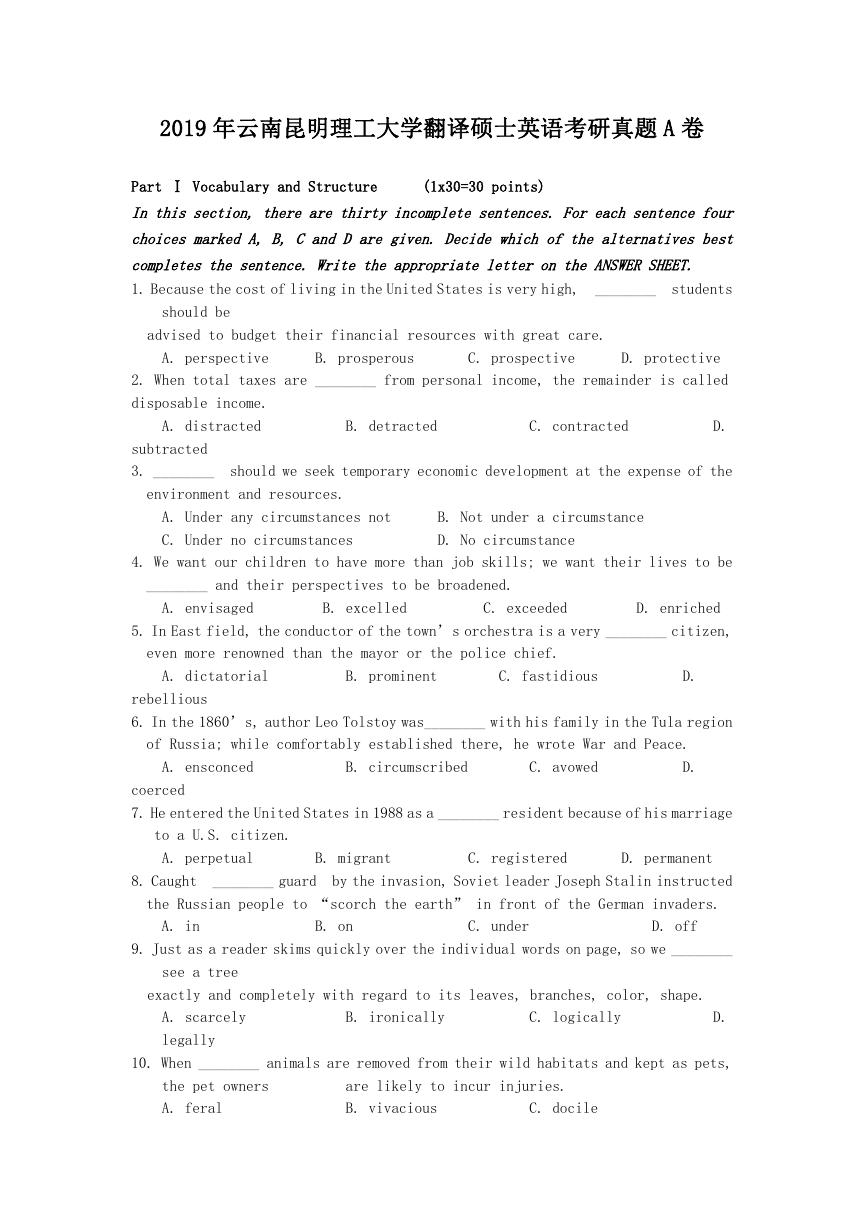
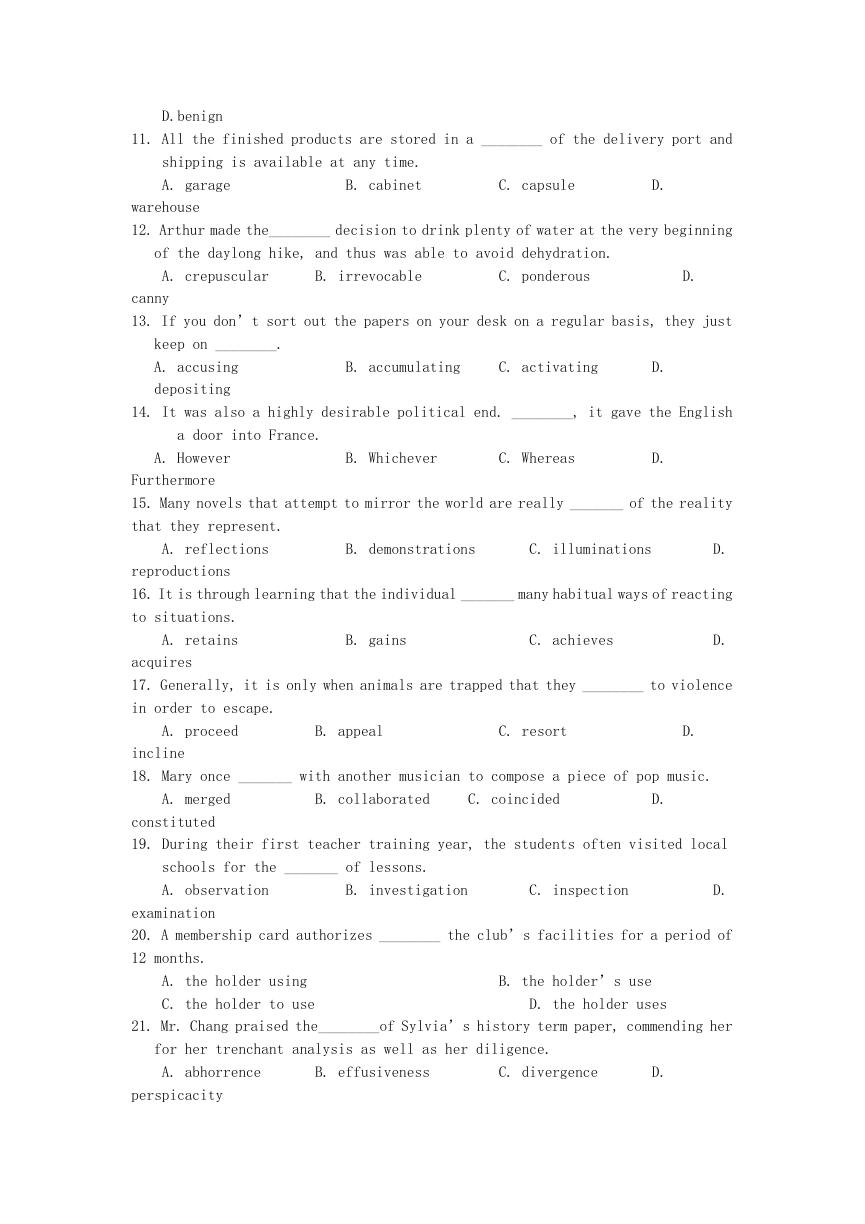

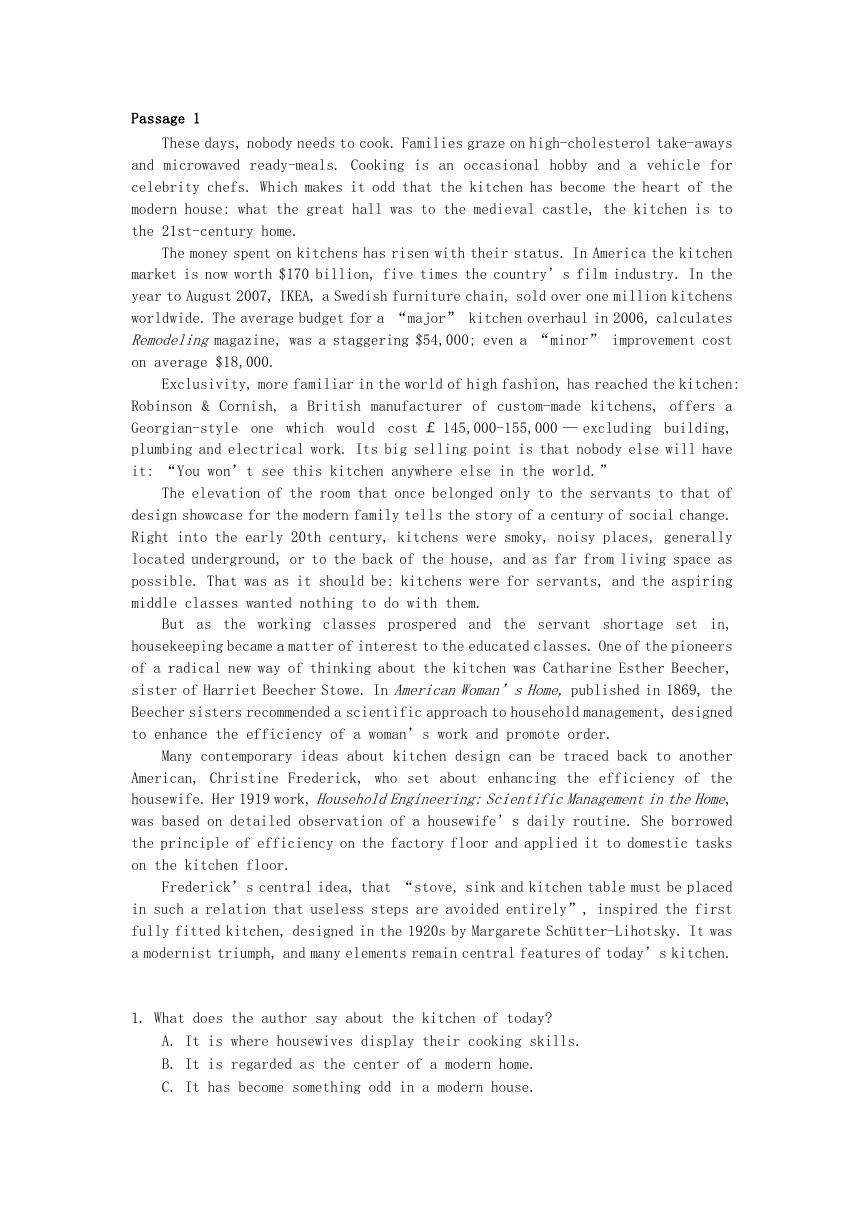

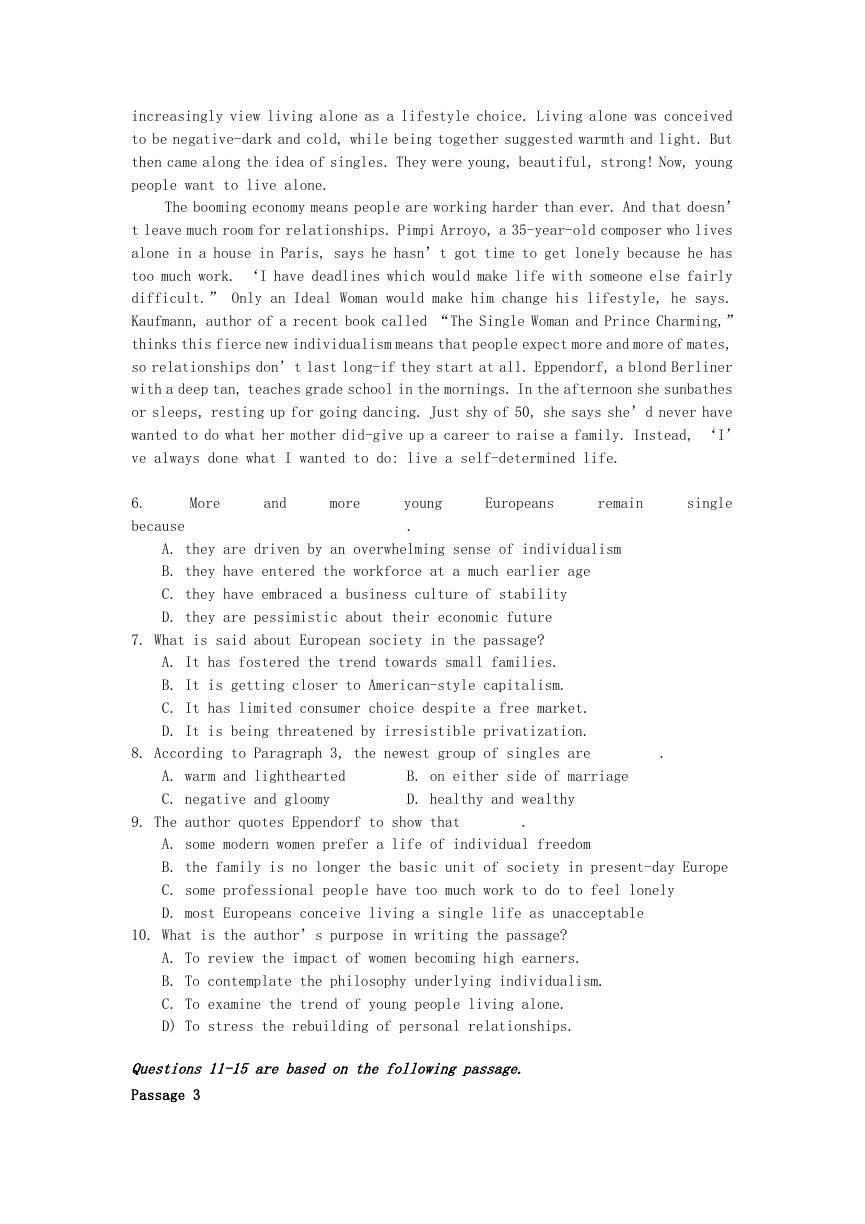

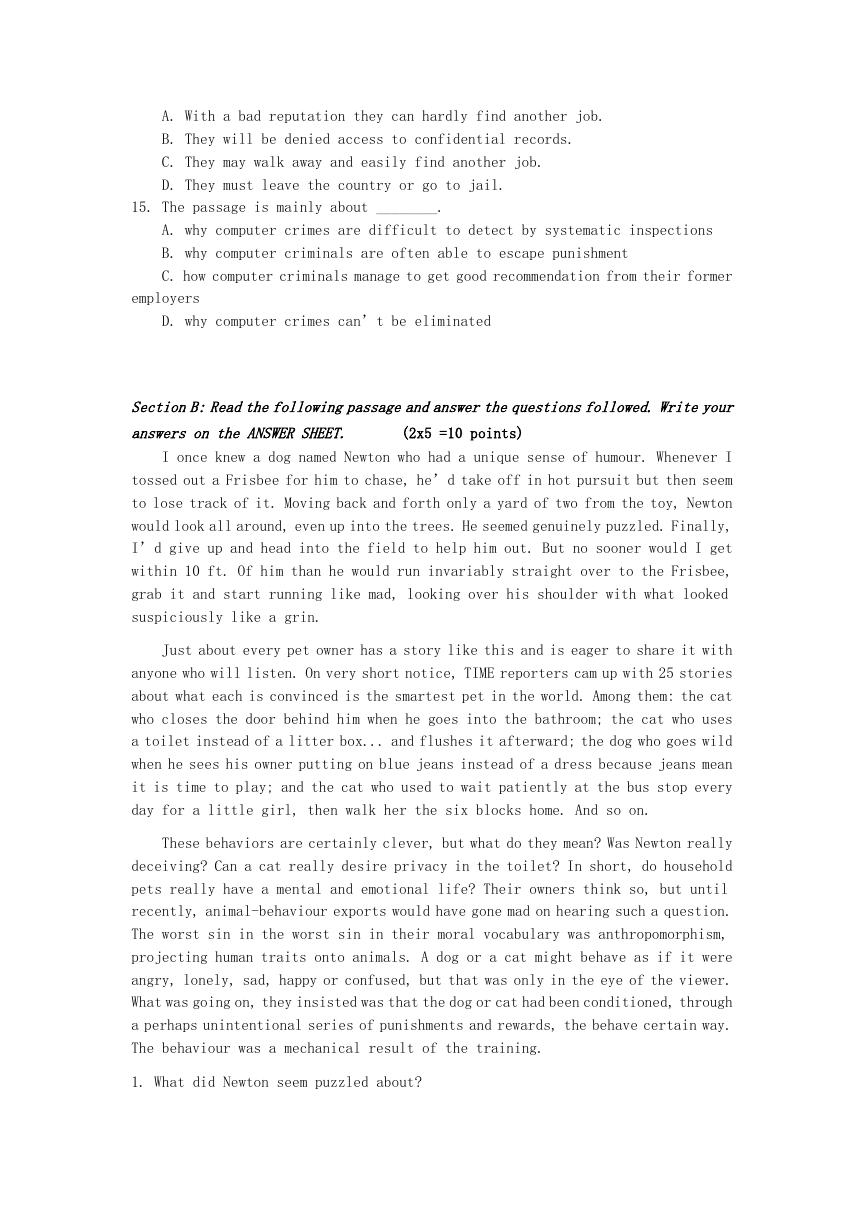








 2023年江西萍乡中考道德与法治真题及答案.doc
2023年江西萍乡中考道德与法治真题及答案.doc 2012年重庆南川中考生物真题及答案.doc
2012年重庆南川中考生物真题及答案.doc 2013年江西师范大学地理学综合及文艺理论基础考研真题.doc
2013年江西师范大学地理学综合及文艺理论基础考研真题.doc 2020年四川甘孜小升初语文真题及答案I卷.doc
2020年四川甘孜小升初语文真题及答案I卷.doc 2020年注册岩土工程师专业基础考试真题及答案.doc
2020年注册岩土工程师专业基础考试真题及答案.doc 2023-2024学年福建省厦门市九年级上学期数学月考试题及答案.doc
2023-2024学年福建省厦门市九年级上学期数学月考试题及答案.doc 2021-2022学年辽宁省沈阳市大东区九年级上学期语文期末试题及答案.doc
2021-2022学年辽宁省沈阳市大东区九年级上学期语文期末试题及答案.doc 2022-2023学年北京东城区初三第一学期物理期末试卷及答案.doc
2022-2023学年北京东城区初三第一学期物理期末试卷及答案.doc 2018上半年江西教师资格初中地理学科知识与教学能力真题及答案.doc
2018上半年江西教师资格初中地理学科知识与教学能力真题及答案.doc 2012年河北国家公务员申论考试真题及答案-省级.doc
2012年河北国家公务员申论考试真题及答案-省级.doc 2020-2021学年江苏省扬州市江都区邵樊片九年级上学期数学第一次质量检测试题及答案.doc
2020-2021学年江苏省扬州市江都区邵樊片九年级上学期数学第一次质量检测试题及答案.doc 2022下半年黑龙江教师资格证中学综合素质真题及答案.doc
2022下半年黑龙江教师资格证中学综合素质真题及答案.doc